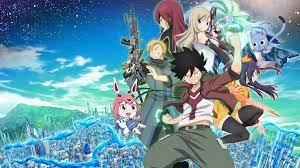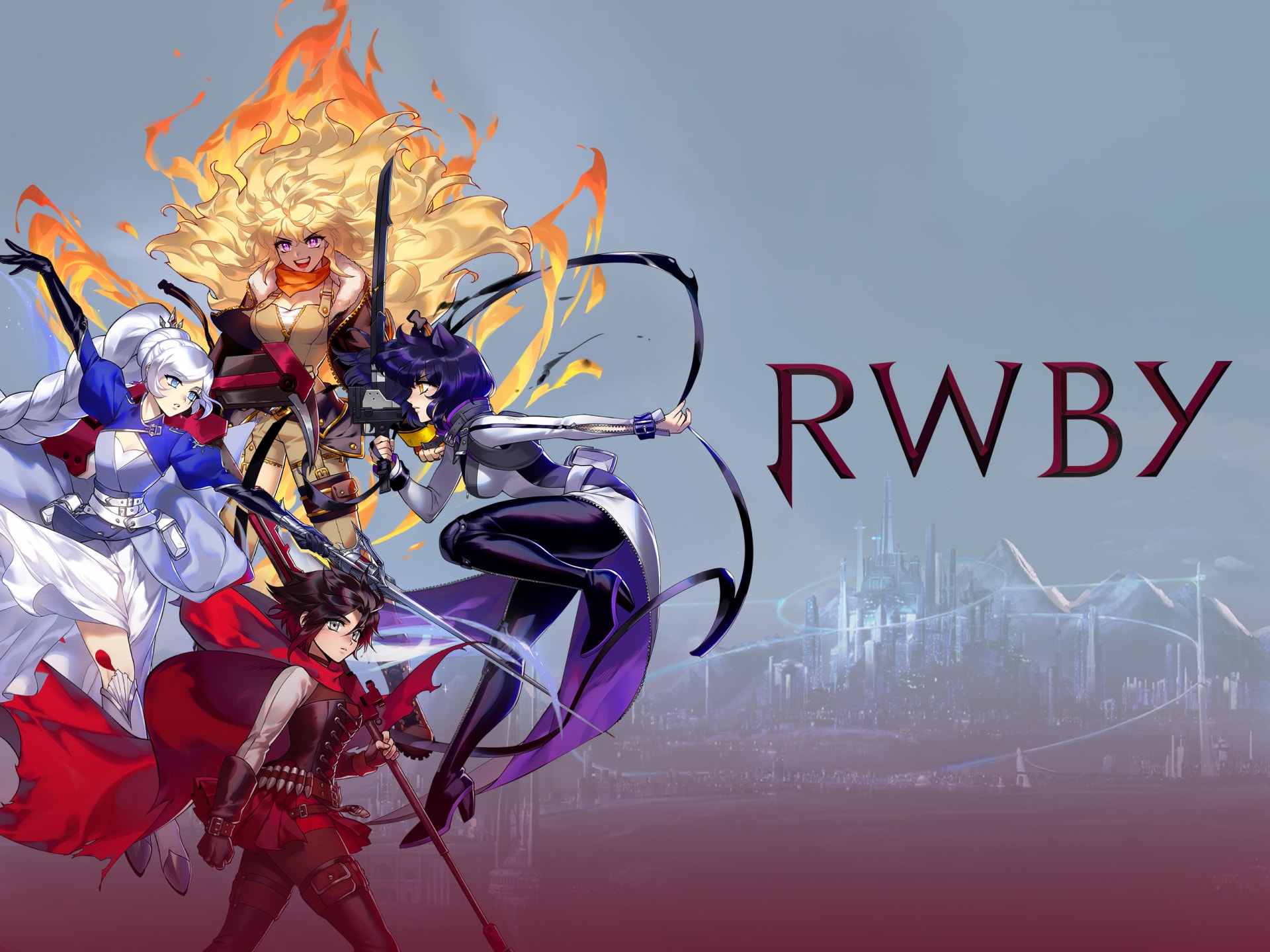English Dub Season Review: Eden’s Zero Season 1 Part 1
Overview: Eden’s Zero is a new sci-fi adventure tale that centers on Shiki Granbell (Sean Chiplock), a young boy taken in by robots at an abandoned amusement park, Granbell Park. After meeting and becoming friends with the optimistic B-Cuber (the universe’s unique high-tech version of a YouTuber), Rebecca Bluegarden (Kira Buckland) and her adorable blue cat companion, Happy (Tia Ballard), he goes on adventure of a lifetime. Searching for the mythical being known throughout space and time as Mother (Colleen Clickenbeard), Shiki and the gang trek across the universe seeing exciting new sights while trying to make as many friends as he can along the way.
Our Take: A comparison often made with Hiro Mashima’s new space romp is with that of his previous fantasy adventure Fairy Tail or even the one before that in Rave Master. And how could it not? The main protagonist along with that of the core cast all resemble that of characters in his past works, not to mention Mashima has a tendency to give characters and groups similar, if not the same, characteristics and names. But is Eden’s Zero really just “Fairy Tail in space?”, as many like to put it, or does it aim higher by shooting for the stars (ba-dum-tss) and actually reach them?
The first half of the season greatly focuses on establishing the various worlds in the cosmos and building Shiki’s group of adventurers throughout. Each new member of the crew brings something new and fun to the table, personality wise, in their extraordinary abilities and how they interact with Shiki, Rebecca and the gang. For instance, Weisz, a future professor and mechanic, is a deplorable jerk and thief, who is never not selfish and/or a pervert. This can come to clash with Shiki’s kinder disposition but the series has their relationship evolve as they form a bond as friends and it becomes evident how both him and Rebecca gradually start to trust him. Not to mention they have plenty of lighthearted moments such as both Shiki and Weisz being enthusiastically dorky buddies or the good ol’ fashioned Mashima staple of girls being longed for like a piece of meat with Weisz creeping over Rebecca. There’s also Homura, a lone samurai, who eventually joins the group seeking a battle with Shiki, because of his new demon lord status taking over for his father, and who searches for her lost master who is also essential to Shiki’s journey. She might be my favorite late edition with her honorable nature making her very commendable with her saying her thoughts out loud often making her a cute, comic relief as well.
As for our main boy, Shiki, he’s the classic earnest young man who is endearing to watch, especially when he experiences life outside of Granbell for the first time. His incessant ranting about friends can be eye-roll inducing at times but doesn’t take away too much from his charm. There are also great subtle aspects that help him differ from a protagonist like Natsu, such as how he actually finds girls attractive and isn’t completely clueless to social cues from them and others. Rebecca is an adorably clueless B-Cuber that it’s comical along with simply being a positive upbeat gal. And Happy, well, like the name implies and similarly to his Fairy Tail counterpart, is happy and the same sweet lovable cat you know and love.
However, beyond the fun venturing through the galaxy, the space opera does what I believe most fans, myself included, would want in establishing defining elements that set it apart just enough from its other older series siblings. Throughout Shiki’s journey, he goes through ordeals that have a surprisingly dark and grueling tinge to them that end up being utterly heartbreaking and, unlike FT, have no happy end when they are over. And it’s not just limited to him either, Rebecca has quite the cruel backstory with Happy that does not shy away from brutality and the emotional toll it has on. These serve to ground these characters and their motivations moving forward in a way I truly wasn’t expecting. It’s science fiction concepts also feel fresh and exciting in how they portray the cruelty of nature as well as put new twists on classic concepts like that of dragons that eat the time of whatever planet they feed on. The art direction is also interstellar as no two planets look the same with Rebecca’s home, Blue Garden, resembling a glossy futuristic water filled wonderland while Weisz’s, known as Norma, being a brown dust sphere with raining earth pillars and an underground cityscape.
With all that being said, there are still plenty of Mashima clichés that will stick out like a sore thumb for fans of his work. Almost all of the series’ villains thus far aren’t worth talking about much. They’re so incredibly generic it’s painful. They range from scummy misogynistic caricatures that explain their evil plans like they’ve been rehearsing it in a mirror to one-note egotistical pricks with a god complex. The only notable exception to that is the mercenary, Jinn, who is more of an antagonist, if anything. He’s got a lot of flair with his hardened disposition and compelling determination making a intense rival for Shiki. And besides the paint-by-numbers villainous figures, there’s the occasional tired tropes too such as the tried-and-true handsy tentacles.
One animation studio that does not get the credit it deserves is J.C. Staff. Their work with a certain Caped Baldy, which was not even that egregious mind you, gets criticized because it wasn’t up to the level of previous studio Madhouse and suddenly they become blackballed by anime enthusiasts. Despite their other great work on A Certain Scientific Railgun, Food Wars, and Is It Wrong to Try to Pick Up Girls in a Dungeon?, it really is a “what have you done for me lately type of world?” The staff proves in these intergalactic escapades that they are more than capable of defying the laws of physics (even though they already have) by delivering incredibly fast paced and beautifully intricate fights utilizing a wide range of ether gear abilities for unique and bombastic battles. Composer Yoshihisa Hirano also does a stupendous job, effectively being able to create different renditions of the main theme throughout that fit the tone of a scene whether they be more action-oriented or lighthearted and relaxing. The entire English VA cast is amazing with three starting leads shepherding the series well in the beginning. Sean Chiplock is energetic and enamoring as Shiki. Kira Buckland is radiantly positive and trustworthy as Rebecca while Tia Ballard is as cheerful as ever as Happy.
Eden’s Zero is a fun leap into the outer reaches of space in showing that Mashima’s line of work is capable of more than just incorporating the power of friendship. Keeping in mind this is just the first half of the season one and still progressing overall, it still is ridden with a lot of the same tropes, clichés and poorly written/developed villains that many have come to groan and tire of. However even with that, it reaches to further heights where past works like Fairy Tail haven’t dared (yet) in establishing heartbreaking trials and tribulations for characters while not attempting to undercut or romanticize them later on, also relying on the heartfelt relationships between the crew as well. It does this while also maintaining the classic good spirited humor along with inventive sci-fi ideas that go above and beyond in their ingenuity but don’t shy away from harsh reality of them as well. With a fast and frenetic start, hopefully the last 12 episodes can fortify the series’ strengths and build more momentum, while doing away with the unnecessary cargo that will, in the end, allow it to go above and beyond.


























Do we know if Hulu will be the only entity to have the dub, or if it will be on other platforms, too? The show in general is definitely going to be on multiple platforms.